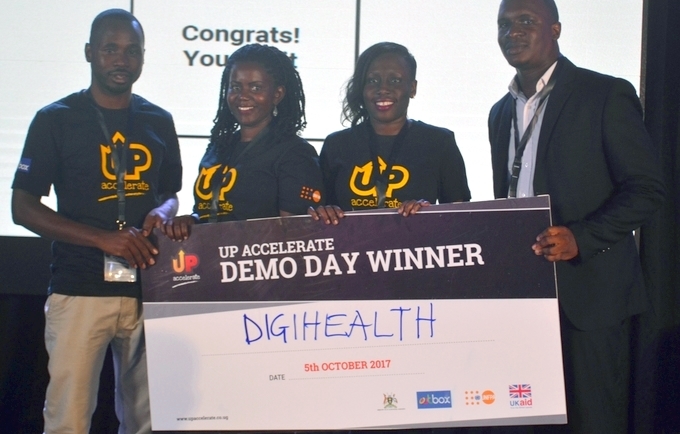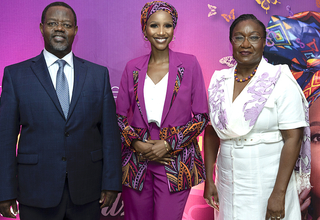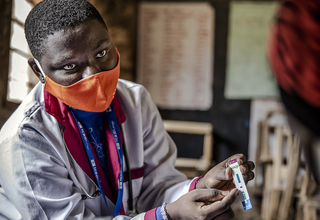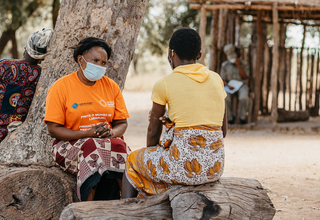KAMPALA, Uganda – Noelle Aryanyijuka is known as the ‘pad girl’ across rural communities and refugee settlements in Uganda. She is the Chief Executive Officer of EcoSmart Pads, a youth-led Ugandan start-up that makes biodegradable disposable sanitary pads from sugarcane residue.
I wanted to create an impact in rural communities and for girls coming from low income backgrounds.
“I wanted to create an impact in rural communities and for girls coming from low income backgrounds,” Noelle says about the development of her innovative idea.
Although EcoSmart Pads plans to roll out its products at half the average market price, at Shillings 3,000 (US 83 cents), its current business model cannot cater for the least resourced girls and women in Nakivale refugee settlement, who can afford only Shillings 200 (US 6 cents), for a pack of sanitary pads.
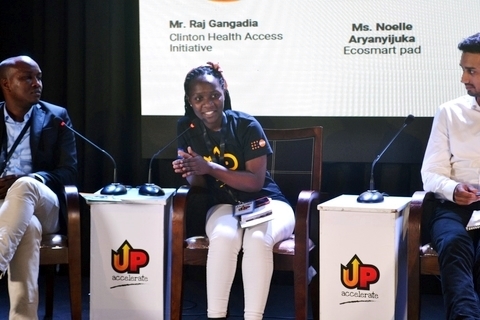
Funded by UKAid from the British Government and implemented by the Ugandan innovation hub, Outbox, the UNFPA Up Accelerate programme has supported Noelle and 25 other young entrepreneurs from seven youth-led start-ups to develop and refine products in sexual and reproductive health and to roll them out.
On 5 October, four of the young start-ups presented their products at the Up Accelerate Demo Day held in Kampala. The event gave the young entrepreneurs an opportunity to raise follow-on funding and explore new partnerships that could enable access to markets.
Innovative business proposals presented to over 150 representatives from the private sector as well as development partners, academia and young people, included a low-cost chest drainage system to remove excess fluid accumulation in the lungs (iDrain), and a low-cost and effective device to follow foetal development inside the mother’s womb in resource-scarce environments (M-Scan).
DigiHealth was chosen as the winner. This is a mobile and web solution to support collection and real-time data analysis during health outreaches. It was selected by an independent panel of judges as the most integrated and market-ready solution.
eHealth can be a revolution for the (Ugandan) healthcare system if we take it up and make it work for us.
The power of eHealth
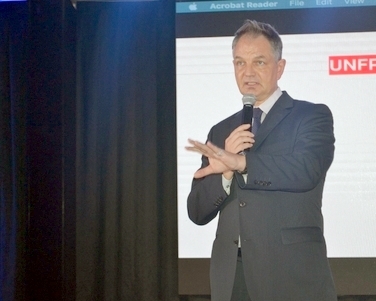
“eHealth can be a revolution for the (Ugandan) healthcare system if we take it up and make it work for us,” said Dr. Anthony Mbonye, Director-General of Health Services at the Ministry of Health.
Increasing access to sexual and reproductive health services, especially among vulnerable populations, requires all stakeholders to “continue supporting […] already developed innovative solutions and those yet to be developed,” said Ritah Nakigudde, Health Advisor at the UK Department for International Development (DFID).
In addition, young people must be enabled to be part of the vibrant ecosystem for social entrepreneurship in Uganda, according to UNFPA Representative, Alain Sibenaler.
The young entrepreneurs who bring us together today are part of that vibrant new generation of Ugandans who are seeking to reinvent the society they live in.
“The young entrepreneurs who bring us together today are part of that vibrant new generation of Ugandans who are seeking to reinvent the society they live in,” he said.
Journey of leadership and innovation
The UNFPA Up Accelerate programme seeks to support the next generation of young Ugandan entrepreneurs to succeed on their journey of leadership and innovation for social change. While the programme has focused on developing market-ready solutions for persistent sexual and reproductive health bottlenecks in Uganda, Up Accelerate results have been multifaceted.
“Working with young people is not just about getting a product out there, but also about developing human capital,” said Richard Zulu, Outbox Lead and implementing partner for the Up Accelerate programme.
UNFPA supports innovation and creativity in sexual and reproductive health as one of its key areas of engagement with young people, with the purpose of creating an ecosystem conducive for social entrepreneurship that can lead to sustainable development in sexual and reproductive health.
– Mina Nozawa and Raquel Palomino Gonzalez
